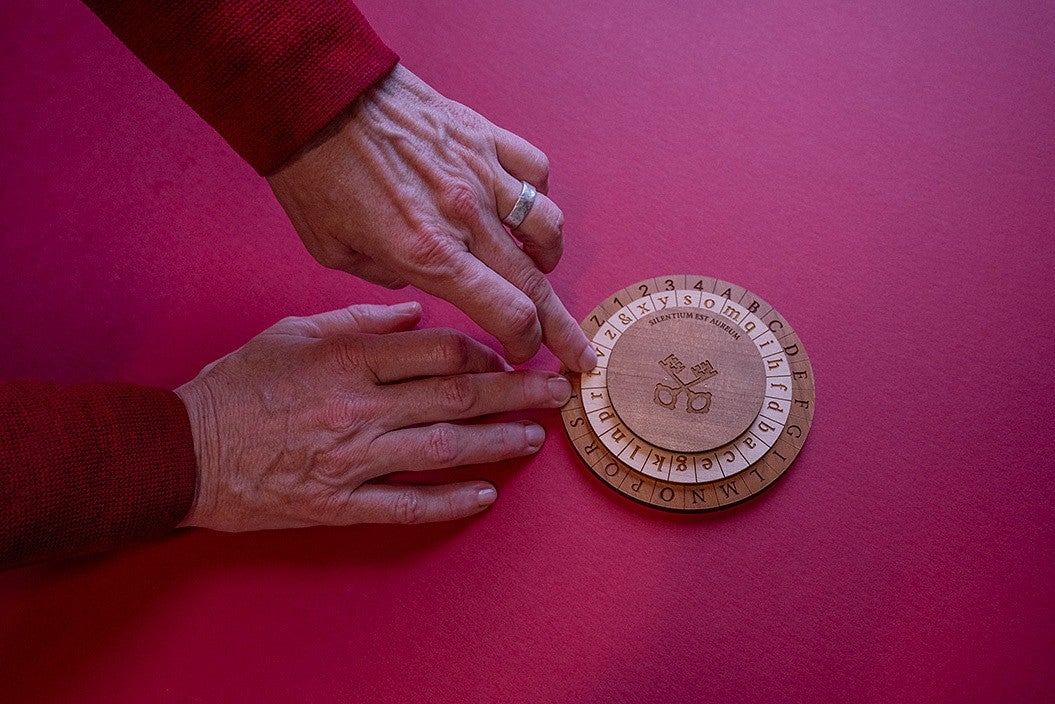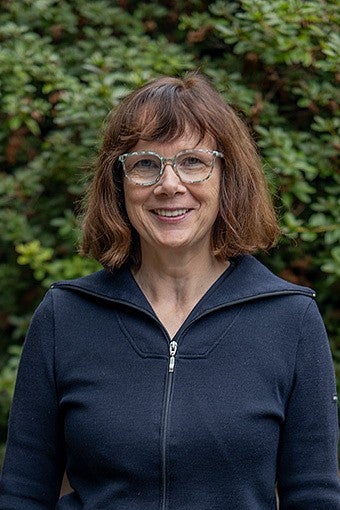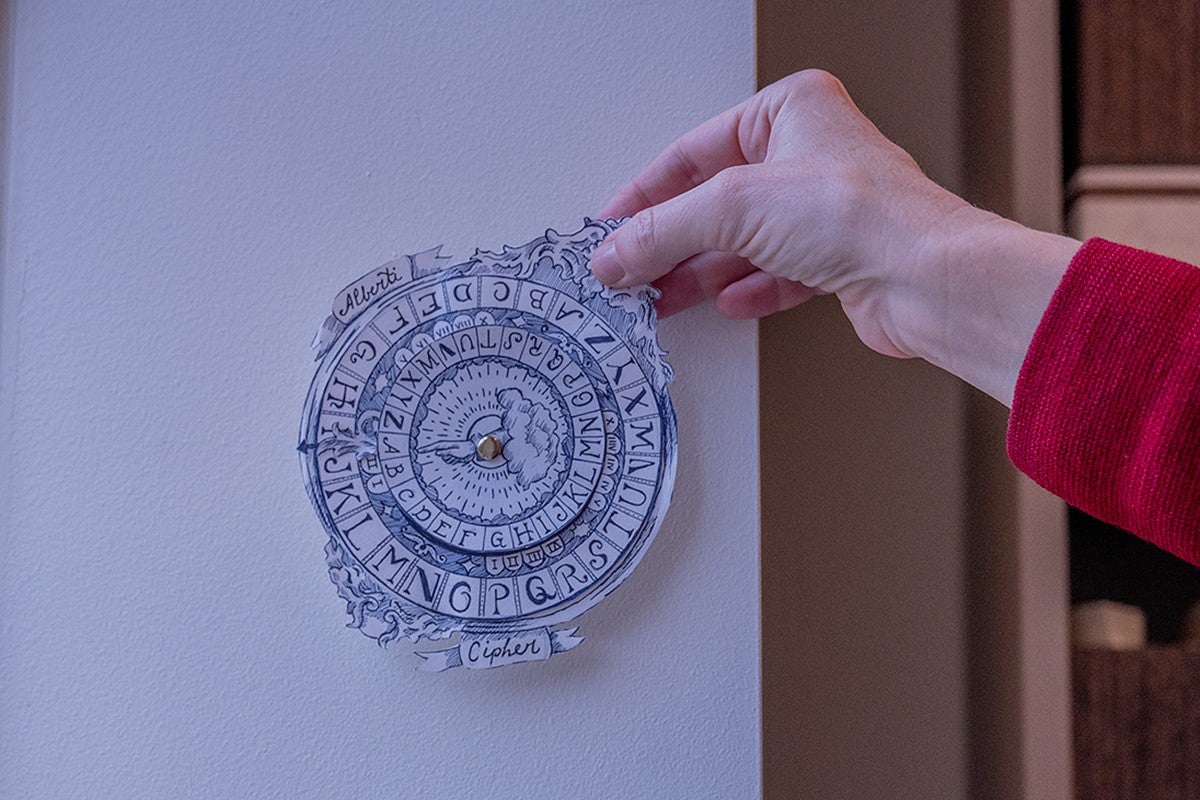
Teaching secrets

CHC classes: 101 Codes and Ciphers: The Cryptographic Imagination; 221 Ancient Drama; 301 Comedy, 434 African American Writers in Paris
Hometown: Munich, Germany and Île de Groix, France
Song on Repeat: “Karantez vro” by Yann-Fañch Kemener
Guilty Pleasure: Buying lottery tickets.
Favorite Movie: Maborosi by Hirokazu Kore-eda
Coffee or Tea: Both
Why I teach at the CHC: I love teaching students who are passionate about learning and curious about niche topics. CHC students and faculty have an amazing range of disciplines. There hasn’t been one day in Chapman Hall where I haven’t learnt something new.
If you take my class, you will: Participate in a lot of small-group discussions; have the option to do a creative final project.
I’m a stickler for: including diacritic signs in foreign language words!
Who can say that they’ve never used a code to share a secret or create an alliance? Who doesn’t love a good puzzle or learning a new language? These basic curiosities draw first-year Clark Honors College students to HC 101 Codes and Ciphers: The Cryptographic Imagination, taught by Corinne Bayerl.
“Almost every student remembers a time in their childhood where they sent secret messages made up of strange symbols to their sibling or their friends in class,” says Bayerl, an associate teaching professor in the CHC. “I think we all have experience, even if it’s limited only to childhood, with encryption.”
Bayerl drew on not only this nostalgia, but also on students’ interest in history, data science and language when she developed this interdisciplinary course that the CHC is best known for. In her field of comparative literature, she also teaches courses on ancient theater, the history of comedy and satire.
Earlier this year, Bayerl received the Thomas F. Herman Award for Specialized Pedagogy from UO’s Office of the Provost, one of a handful of instructors recognized on campus, for her deep expertise and the strength of her teaching.
“Corinne has taught at every level of the CHC curriculum with skill and distinction,” says Carol Stabile, dean of the Honors College. “Not only is she is an extraordinary teacher and scholar who models inclusion and engagement, her courses are constantly evolving to provide an experience that meets students where they are.”
Bayerl, who grew up abroad and speaks four languages, also stepped into mentoring CHC’s five international first-year students this year. The opportunity thrilled her.
“Besides being a source of joy for me, I would say I hope I can support them with a sense of orientation when they are confused about things here,” Bayerl says.
Her childhood took place between Munich, Germany and Île de Groix, France, in a multilingual household of readers “surrounded by thousands of books.” She knew she wanted to study literature at university, and it was clear to her that it shouldn’t be limited to that of one country.
“I wasn’t sure to which career that would lead, and I didn’t care when I studied,” she says. There was far less pressure in Europe’s free higher-education environment to tie studies directly to career goals, she says. “I always knew that I wouldn’t have a huge salary afterwards, but I could earn my life.”
As an undergraduate student of comparative literature in Paris, she worked in bookshops and literary agencies, and after completing a master’s degree at Ludwig Maximilian University in Munich, she worked in publishing for nearly a decade, a career that eventually brought her to the United States where she continued her studies.
When Bayerl completed her PhD in 2014 at the University of Chicago, she had already begun teaching at the University of Oregon in several language and literature departments. With a desire to anchor herself, she gravitated toward the CHC and eventually made her academic home here. She’s been a core faculty member since 2022.
“While I miss working with multilingual students and teaching texts in foreign languages, (I appreciate) the opportunity to have a real home unit where I can teach really motivated students who love coming to class, are on time, are prepared,” Bayerl says.

Several of her courses look at theater across cultures and centuries, often focusing on comedy and satire. She asks students to consider what defines each genre, what its purpose is, and what makes it effective. For instance, what are comedy’s universal elements and which ones are culturally specific?
Another course on African-American writers in Paris centers on the work of James Baldwin and Claude McKay. Lainie Bell, a senior marine biology major who took the class, says she enrolled despite the subject lying outside her comfort zone.
“I knew I’d enjoy Corinne’s insights and methods for teaching the material,” says Bell, who had already taken a cryptography seminar from Bayerl and appreciates how both classes got her out of the science bubble. “I felt comfortable branching out because I knew she’d make the course accessible and I wanted to continue learning from her.”
Bell describes Bayerl as the kindest instructor she’s met at UO: understanding and accommodating while maintaining high expectations for students.
“She is very knowledgeable and challenges students to engage deeply with the material,” Bell says, “but she does so in a way that makes the process exciting instead of daunting. I always felt welcome to speak but never pressured.”
Though the freedom to teach material on which they are experts is a big attraction for faculty members in the CHC, Bayerl says her favorite class might actually be one for which she didn’t write the syllabus: HC 477 Thesis Prospectus. It's a class in which upper-class students refine and design their individual research projects. Like her own students, Bayerl treasures the chance to be exposed to topics she wouldn’t be otherwise.
“It’s just great to hear what people are interested in, how they approach their topic, with which they work entirely different methods than I do,” she gushes. “I would almost say that BBC podcasts and the Honors College thesis prospectus class are my main sources of education where it comes to fields I’m not trained in. Honors College students have really deepened my general knowledge.”
So far this academic year, she’s serving on 12 thesis committees across the spectrum of academic fields. Bayerl also has professional experience with editing and relishes the chance to engage with the written component of the thesis. She’s known for providing robust feedback, often more than the primary thesis advisor does, students report.
Bayerl also admires CHC students for their determination, especially when it comes to roadblocks in the thesis process. “Just overcoming obstacles where I’m not sure I wouldn’t have given up, but they stay with it,” she says. “In the Middle Ages, Christian monks called it ‘the grace of perseverance,’ and I think a lot of CHC students have that.”
Students often feel incredibly anxious during the thesis defense process, says Anita Chari, a political science professor and CHC colleague of Bayerl’s. In a couple of instances, Chari says Bayerl helped student advisees get through “emergency situations” in their defenses in which they were struggling to get words out.
She employed a special breathing technique, based on her study of embodied practices, that helped the students ground themselves in their physical body.
“Corinne facilitated the students to take a break and to do some breathing practices, to wonderful effect,” says Chari. “The students were both able to resume their defenses with much more presence.”
Though Chari and Bayerl teach together in CHC, they first met in a trauma-informed pedagogy group that Chari led through the university’s Teaching Engagement Program.
“I was struck at the impressively wide breadth of Corinne's interests, from early modern European literature, to cryptography, to the embodied practices we were practicing together,” Chari says. “Corinne is truly unique in the vast scope of her scholarly and teaching interests.”
A fantasy class Bayerl has been dreaming up would have her team-teaching with CHC colleague Kristen Rahilly, a volcanologist. “There are great literary texts about volcanic eruptions, and I think we would probably need to add earthquakes,” says Bayerl, “but as long as they don’t happen to you personally, in fiction they’re just great.”
Forever expanding her knowledge to enhance her courses, Bayerl returns frequently to Europe on research fellowships. Next summer, she’ll be at the Herzog August Library in Wolfenbüttel, Germany, working on projects concerning cipher wheels, the rotating encryption devices that let users substitute one letter of the alphabet for another.
Why, she wants to know, did 16th-century writers of cryptography manuals begin using the intricate wheels in their books, instead of the simpler tables that preceded them? What pushed this evolution of the device? For whom was it done? The answers can unlock the world of codemakers and offer insights into the many ways in which encryption impacts society.
The secret to Bayerl’s approach in the classroom lies in her ability to identify topics that both draw on her expertise and activate universal emotions in a way that truly engages students.
Despite the notion that secrets are meant to exclude, the joy of studying encryption as a class is tangible in the caliber of student projects produced in Bayerl’s cryptography courses, such as a talking drum cipher in a video made by alum Reilly Gault, CHC Class of 2024. After all, what is a code if you don’t have someone to share it with?
